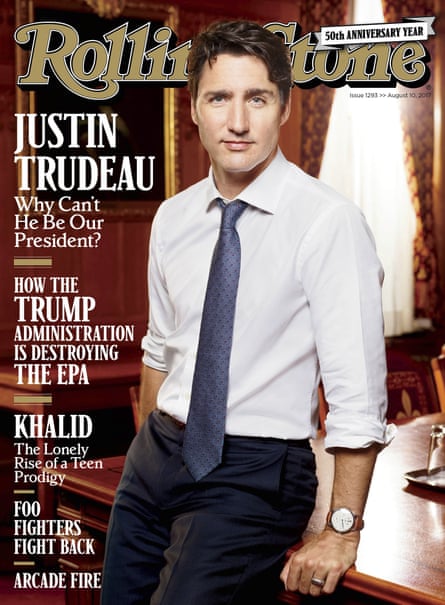In one corner stood Canada’s youngest senator, heavily tattooed and armed with a black belt in karate. In the other stood a lanky Justin Trudeau, the underdog whom bookies were giving 3-1 odds against.
That 2012 boxing match marked a pivotal moment in Trudeau’s political career. But his account of the episode is now raising eyebrows, after he offered a glimpse into his decision to take on indigenous politician Patrick Brazeau.
“It wasn’t random,” Trudeau told Rolling Stone magazine in an interview published this week. “I wanted someone who would be a good foil, and we stumbled upon the scrappy tough-guy senator from an indigenous community. He fit the bill, and it was a very nice counterpoint. I saw it as the right kind of narrative, the right story to tell.”
The comments – part of a 6,800-word August cover story on the prime minister – sparked immediate reaction. “So ‘privileged white guy beats up Indian’ was the ‘right kind of narrative?’ Seriously?” wrote one person on Twitter, while another noted: “White guy in power & entitlement looks 4 an #Indigenous human to beat up so he looks like a strong white dude. How precious & colonial supreme.”
Others pointed to Trudeau’s much vaunted commitments to diversity and tackling the deep-rooted inequities facing many indigenous peoples in Canada. “What is up @JustinTrudeau after all your talk of inclusion you brag about beating up a guy with the issues you swore to address,” tweeted one.
Another said: “Trudeau literally using indigenous people as political props.”
The encounter came to a halt in the third round as Trudeau pummelled Brazeau in a corner, but it marked the beginning of Trudeau’s rise to Canada’s top office.

Brazeau – who told reporters after the match that it was his ego, not his reddened nose, that was most hurt – would later be cast out of the Conservative caucus following a 2013 arrest for sexual assault and domestic abuse.
As Trudeau’s description of planning the boxing match made the rounds online, some questioned how it squared with Trudeau’s promise to repair the country’s relationship with the more than 1.4 million indigenous peoples – many of whom grapple with rates of poverty, incarceration and suicide that are much higher than non-indigenous Canadians.
Many continue to reel from the effects of Canada’s church-run residential school system – described by last year’s truth commission as a tool of cultural genocide – while systemic inequalities have left some living in inadequate, overcrowded housing with undrinkable water.
Algonquin artist Jay Odjick pointed to Trudeau’s comments as a possible explanation for the slow pace of reconciliation. “Canada, your leader went to US media today saying that when he needed a villain to fit his narrative, an indigenous person was a good fit,” he wrote on Twitter. “The sad fact is, WE are the only people he could get away with in terms of this. Think about perception if he had chosen another PoC person.”
On Thursday, Trudeau’s office pointed to the launch of a national inquiry into missing and murdered Indigenous girls and women as well as government promises for investment in education, infrastructure and healthcare to highlight the prime minister’s commitment to Indigenous issues. “He has made it clear that there is no relationship more important to him – and to our government – than reconciliation with Indigenous peoples,” a spokesperson for Trudeau said in a statement to the Guardian. “We are fully committed to a renewed nation-to-nation relationship and to reconciliation.”The Rolling Stone interview – promoted on the magazine with the question “Why can’t he be our president?” – prompted intense debate in Canada.
Many lauded the profile, which included phrases such as “For Trudeau, listening is seducing” and sought to contrast Trudeau with Donald Trump. Polls suggest Trudeau’s approval rating among Canadians remains high, at around 53%, 20 months after his government took power.
But others reacted with skepticism, pointing to Trudeau’s broken promises on electoral reform and deficit spending as well as his government’s sluggish response in addressing indigenous issues.
“This yearning for an anti-Trump to call their own means the US media are glossing over or ignoring the troubling similarities between both leaders, not the least of which is an obsession with celebrity that is ultimately counterproductive to governance,” wrote Toronto Star columnist Vinay Menon. “The attention might be nice. But a bit more neighbourly honesty would be even better.”